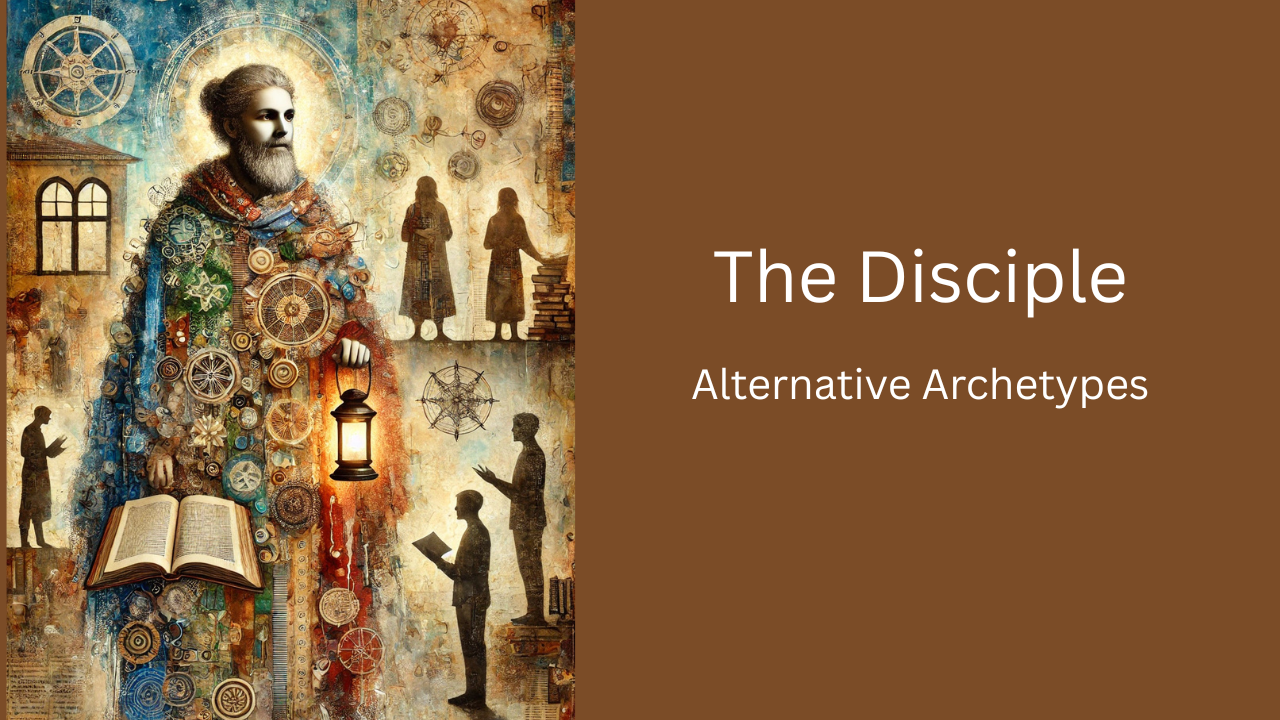Keeping a Nature Journal by Clare Walker Leslie is more than a drawing guide — it’s a soulful invitation to observe, reflect, and reconnect with the living world. Filled with inspiring sketches, accessible tips, and gentle wisdom, it turns simple moments outdoors into a contemplative practice. Ideal for those seeking a meaningful, creative habit rooted in nature and self-awareness.
Reconnecting with The Disciple
A Deeper Exploration
A few weeks ago, I shared a blog post introducing The Disciple —one of the Alternative Archetypes from my ongoing project exploring soulful, meaningful ways of being in the world.
Since then, I’ve created a short video offering a deeper dive into this archetype. In it, I expand on the themes I touched on in the blog post.
Sometimes hearing it spoken aloud, or experiencing it in a different medium, can spark fresh insights.
✨ You can watch the video below—and if you missed the original blog post, you’ll find it here.
If the archetype resonates with you, I’d love to hear what aspects stood out—or how you see it showing up in your life. Feel free to leave a comment or share your thoughts.
Stay Connected to the Journey
Don’t miss a single archetype.
Sign up for the Alternative Archetypes monthly newsletter and unlock our free Wisdom and Insight archetypes guide – a beautifully illustrated gateway to the archetypes of intuition, insight, and inner light.
Each month you will receive:
- A round-up of the newly released cards
- Insights into the meaning behind each archetype
- Reflections and philosophy from the heart of the project
The Six Key Life Domains
A meaningful life begins with understanding what truly matters. In the journey toward discovering and fulfilling your life purpose, certain areas of life hold particular significance. These are the Six Key Life Domains – universal aspects of human experience that form the foundation of a balanced and fulfilling life.
When we take time to reflect on these domains, we create a map of what nourishes us, where we may feel depleted, and what truly supports our sense of purpose.
Prefer to watch rather than read – check out the video below
Relationships and Connection
As social beings, meaningful relationships provide emotional support, a sense of belonging, and opportunities for personal growth. These connections are essential to our mental and emotional well-being. Without them, we risk isolation, which can detract from our sense of purpose.
Who do you feel most connected to? Where do you feel most seen?
Personal Growth and Development
As we deepen our relationships, we’re also invited to grow within ourselves. Continuous growth ensures that we are evolving, learning, and meeting life’s challenges with greater insight. This domain is the key to self-actualization and resilience, helping us become the best version of ourselves.
It’s through growth that we come into deeper alignment with our purpose.
Contribution and Service
A sense of purpose often emerges when we give of ourselves to something larger. Whether it’s helping others, volunteering, or supporting causes we care about, acts of service connect us to a bigger picture.
They don’t just benefit others—they nourish our own sense of meaning.
Meaningful Work
Work occupies a significant portion of our lives. When aligned with our values, interests, and strengths, it can be deeply fulfilling. Whether it’s paid or unpaid, meaningful work gives us a sense of accomplishment and a way to contribute to the world.
Is your work an expression of your values—or just a way to get by? The difference can be life-changing.
Health and Well-being
Good health is the foundation of a vibrant life. When we attend to our physical, mental, and emotional well-being, we have the energy to engage fully with the other domains.
This includes leisure and recreation—often overlooked yet vital. Modern life tends to glorify productivity, but leisure offers a sanctuary for joy, creativity, and self-renewal. Engaging in hobbies or creative outlets reminds us that we are more than our responsibilities. It helps us reconnect with ourselves and nurture a sense of self-worth.
Spirituality and Transcendence
Spirituality connects us to something larger than ourselves—whether through a religious path, personal practice, or existential exploration. Reflecting on life’s bigger questions can offer grounding, clarity, and a sense of peace that transcends the everyday.
What helps you feel connected to the mystery and meaning of life?
Why These Domains Matter
Together, these six domains shape the human experience. By nurturing each one, we begin to live more in alignment with our deepest values, creating a life that feels both balanced and purposeful.
Each domain represents a gateway to fulfilment. Reflecting on where you stand in each area can help you identify your strengths and opportunities for growth—empowering you to make intentional changes that support your soul’s unfolding.
A Note on Money
You may have noticed that money isn’t listed as one of the six domains. Why leave out something so integral to modern life?
The short answer: Money is a tool, not a purpose. It supports the six domains, but it doesn’t define them.
Overemphasizing money can lead to burnout, emptiness, or a distorted sense of self-worth. When we honour money as a valuable enabler—rather than a driver—we keep the focus on what truly matters: creating a life aligned with meaning, not just metrics.
Your Invitation
Take a moment to consider:
Which domains feel strong and life-giving right now?
Which ones might need more care and attention?
Reflecting on these questions creates a strong foundation for the journey ahead. In the Soulful Path to Life Purpose programme, we explore how deeper self-knowledge can help bring each of these domains into greater harmony – so your life reflects not just who you are, but who you’re becoming.
The Poet
The second in the Creative & Expressive pathway in the Alternative Archetypes project, The Poet archetype brings soulful expression to life, transforming emotion into eloquent language. Sensitive and perceptive, they help us reconnect with beauty, meaning, and shared humanity in a fragmented world.
Why this life purpose coaching approach is different
Here’s the video version of last week’s post in case you’d rather watch than read – it can sometimes prompt fresh insights to see a topic in a different medium.
Awakening the Sacred Feminine: A Journey Worth Reading
What happens when a woman begins to question the roles she’s been handed—and dares to seek something deeper? In The Dance of the Dissident Daughter, Sue Monk Kidd offers a deeply personal account of that awakening. It’s a courageous, often uncomfortable, but ultimately empowering journey into a new way of seeing the self, spirituality, and the sacred feminine.
If you’ve ever felt confined by traditional expectations or longed for a spirituality that speaks to the wholeness of your experience as a woman, this book may resonate deeply.
I’ve written a full review exploring the themes of feminine empowerment, spiritual reimagining, and inner authority. You can read it here:
Reconnecting with the The Wilderness Dweller
A Deeper Exploration
A few weeks ago, I shared a blog post introducing The Wilderness Dweller —one of the Alternative Archetypes from my ongoing project exploring soulful, meaningful ways of being in the world.
Since then, I’ve created a short video offering a deeper dive into this archetype. In it, I expand on the themes I touched on in the blog post, including its gifts, shadow qualities, and the role it might play in your own life journey.
Sometimes hearing it spoken aloud, or experiencing it in a different medium, can spark fresh insights.
✨ You can watch the video below—and if you missed the original blog post, you’ll find it here.
If the archetype resonates with you, I’d love to hear what aspects stood out—or how you see it showing up in your life. Feel free to leave a comment or share your thoughts.
Stay Connected to the Journey
Don’t miss a single archetype.
Sign up for the Alternative Archetypes monthly newsletter and unlock our free Wisdom and Insight archetypes guide—a beautifully illustrated gateway to the archetypes of intuition, insight, and inner light.
Each month you will receive:
Reflections and philosophy from the heart of the project
A round-up of the newly released cards
Insights into the meaning behind each archetype
How Is This Approach to Life Purpose Coaching Different?
In our last post, we explored the Spiral Path approach to life purpose—an evolving, reflective way of designing a meaningful life rooted in your own values, personality, and inner wisdom.
But you might be wondering: How is this different from other life coaching programmes or personal development frameworks?
It’s a good question—especially in a world full of courses promising quick results, instant clarity, or the perfect “life plan.” The Soulful Path to Life Purpose programme offers something quite different.
Prefer to watch instead? Here’s a video version of this post
Here’s how.
1. It’s Not About Hustle or Hyper-Productivity
Many popular approaches to purpose are built around productivity: set a goal, make a plan, push yourself to achieve it. While there’s value in structure and momentum, this model can feel exhausting—especially if you’re someone who thrives on reflection, not speed.
The Spiral Path approach honours your natural pace. It makes room for pauses, detours, and the quieter seasons of life. Purpose isn’t a race; it’s a relationship with your deeper self that unfolds over time.
2. It Recognises Complexity, Not Just Clarity
We often hear that if you can’t state your purpose in one sentence, you don’t know what it is. But for many of us, life doesn’t work like that. We hold multiple callings. We change. We grow. And sometimes, we’re still figuring things out.
This approach allows for that. It helps you live with the complexity of being human, rather than trying to reduce your life to a neat tagline. It values honest exploration over forced certainty.
3. It’s Soulful, Not Just Strategic
There’s no shortage of life design tools out there—but many of them stay on the surface. They focus on habits, mindset shifts, or career plans without touching the deeper questions.
The Spiral Path approach is different. It creates space for soul. For longing. For intuition. It draws from both psychology and spiritual traditions, helping you explore not just what you do but who you are becoming.
4. It’s Informed by Life Stages and Depth
Purpose doesn’t mean the same thing at every stage of life. What matters to you at 25 may not be what matters at 55. Some coaching models overlook this, offering a one-size-fits-all solution.
The Spiral Path approach draws on human development theories, including ideas from depth psychology. It’s sensitive to where you are on your life journey and invites you to make meaning from your past, present, and emerging future.
5. It Brings the Whole of Life into View
Many people come to life coaching because of a work or career question. But when you scratch the surface, the real questions often go deeper: What kind of life do I want to live? Who do I want to become?
This is why the Spiral Path approach includes your whole life: your relationships, wellbeing, spirituality and sense of contribution. These areas don’t exist in isolation—they influence each other. This approach helps you find purpose that weaves through every part of your life.
6. It Allows for Healing, Not Just Planning
It’s hard to plan a meaningful life if you’re carrying old wounds, harsh self-judgments, or doubts about your worth. But many personal development approaches ignore this emotional layer, focusing only on goals and actions.
The Spiral Path approach is different. It makes room for self-compassion. It recognises that some of the most important steps toward purpose involve healing, releasing outdated beliefs, and learning to trust yourself again.
A Path That Reflects You
Ultimately, what makes this approach different is that it doesn’t tell you who to become—it helps you uncover the life that’s already waiting to emerge through you.
It’s not a formula. It’s a journey—one that honours your individuality, your complexity, and your unfolding story.
Curious to explore this journey for yourself?
The Soulful Path to Life Purpose programme is designed to help you reflect deeply, reconnect with what matters, and start shaping a life that feels meaningful and true.
Order before 22nd May 2025 and get a 10% discount
The Creative & Expressive Path
Reclaiming Everyday Soulfulness
In a culture that often equates creativity with performance or professionalism, it’s easy to forget that creative expression is a birthright – not a luxury. The Creative & Expressive Path honours the everyday artist in all of us. Whether through images, stories, poetry, or humour, this path invites us to make meaning, connect deeply, and express what can’t be said any other way.
In this new page in the Alternative Archetypes series, we explore how archetypes like the Artist, Poet, Storyteller, and Humourist help us channel emotion, cultivate authenticity, and build soulful community. These archetypes aren’t about being “good” at art – they’re about reclaiming expression as a form of healing and truth and as a means to connect to deeper parts of ourselves. You’ll also get to meet the first Alternative Archetype on this path, The Artist – The creator of everyday beauty, who celebrates the act of making, valuing process over perfection and inviting all to reclaim creativity as an essential human experience.
The Spiral Path Approach to Life Purpose
After writing about this recently, I wanted to share a few extra thoughts in this short video.
Sometimes a different medium sparks new insights!
Catch the video below — and if you missed the full article, it’s here







